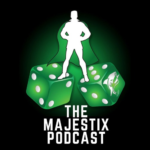Getting Into the Competitive Game Mindset
By Jason Collins
In my 2 years as co-host of Married with Clix and the man in charge of our competitive content, it dawns on me that many of the players with questions for our channel are unfamiliar with the mindset of the competitive player. It’s not just about building the right team or having the right figures. In fact some of the best players who’ve won major tournaments don’t own most of the figures they win with, and the right team doesn’t always come from the player piloting in. So from there what is it that makes a champion tick? What do these players do that sets them apart? There is an answer. It’s a series of “soft” skills.
You see in Heroclix there are “hard” skills which include collecting, team building, and figure placement. These skills are all skills that can be taught, and anyone can acquire these skills (see later articles). These soft skills though, are built out of habit, out of practice. Practice is something that fans of my channel know I preach, so understand that developing these skills will take its own type of practice and a lot more habit forming. So without further adieu and word count padding allow me to introduce the soft skills it takes to make a champion.
 #1 Improvisation
#1 Improvisation
Not everything goes right with your team.
Not every team you make is going to work.
Not every game plan gets passed the roll for map.
No 10-damage combo is immune to critical misses.
These elements in the game are all things that can really throw a player through a loop. The ability to react to these sorts of problems is a hard skill to develop and if it’s something that doesn’t come naturally to you it takes some really strange thinking to develop this skill.
The first step to take in developing this skill is to understand ALL the powers on the PAC (Powers and Abilities Card). There are some elements of powers that even some of the most veteran players I know aren’t aware of. This knowledge can help improve your reactions and put your opponent in the position to have to improvise. The next step is to practice improvising. “How do you practice Improvising?” you ask. The best way to do this, go to a casual tournament, or play a few friendly games at home, and pick figures you’ve: A) never played with, and B) have very limited dial knowledge of. You can also use release week Sealed to practice this. Walking into a game blind can without a shadow of a doubt help you work on your ability to work in unfamiliar territory and improve your ability to think on your feet and react. Over time, a great player’s improvisation skills will actually be or at least seem like, a part of a long term game plan.
 #2 Patience
#2 Patience
Some players are still in the mindset of barreling down the board and making their opponent dead.
Some players see their opponents run and lose their minds.
Some players didn’t see something their opponent could do, and get caught in a trap.
While Heroclix is a timed game, some people think the timer is a reason to rush the game. To get their 3 actions in as fast as possible and move the game along quick as possible. This thinking is part of what separates the minds of a great player from a good player. Being of the right mind to think through your actions and actually realize outcomes can really set a player apart and improving this can put your mind ahead.
*Patience is my own personal demon in Heroclix, so when I lay out my plans of action below, I will be describing how I myself intend to deal with this weakness of mine.
*DISCLAIMER: this is a harder skill to develop at tournaments as it requires time and could slow down some games and could lead to accusations of stalling until the skill is developed. So arrange home games or non-tournament games at your store so that you can develop this skill.
In learning patience the first step to improving it is talking out your turns including you plans and the possible outcomes. Note that I’m not suggesting that you do this during a tournament or all the time, but doing this during practice will help you develop the thought patterns you need to become more patient. When you play the game you’re doing everything in your power not to give away your game plan, but when you go without forethought or don’t weigh ALL the pros and cons of your next action, you run into traps or missed opportunities. Take the time to talk out what you plan on doing and what your opponent could do to react to that action. After talking out your turns for a while, stop talking it out and start internalizing the speech (only once you feel you have the handle on your awareness of the board).
After that, it’s time to slow down your turns. Now I’m not saying it’s necessary to take 5 – 10 minute turns. What I mean is think through your actions, take a little extra time to see what’s going on and you’ll feel your longer turns, but also ensure value in those turns. Part of improving patience is being able to take a little longer and thinking things through.
 #3 Attitude
#3 Attitude
There’s a common element to repeat champions. They all have a healthy attitude about the game. To be great at Heroclix, there has to be an enjoyment and love of the game. The best competitive players aren’t only checking their return on investment on prizing; they aren’t only looking for big money prizing; Heroclix doesn’t have that level of value. What the best players are doing is really just playing the game. The prizes are a reward for doing well, and playing competitively is its own level of fun. Also, if you play this game without enjoyment it can become stressful. Keep in mind that it’s fun and remember the prizes are sugar and candy on top of being able to get out and have fun in one of the best gaming communities I’ve ever been a part of (having experienced competitive Magic & Vs. System). So don’t forget, while we are talking about the grander Metagame, take some time, take a break, play a silly game every so often. Having some fun can help to avoid the burnout that can occur from only thinking in the competitive mindset.
For those of you considering competitive play, or trying to figure out what’s missing in your game look to these soft skills to work on. They may be able to help you improve your game in the long run.




All very good points, nice to see you writing here as well Jason – love the channel!